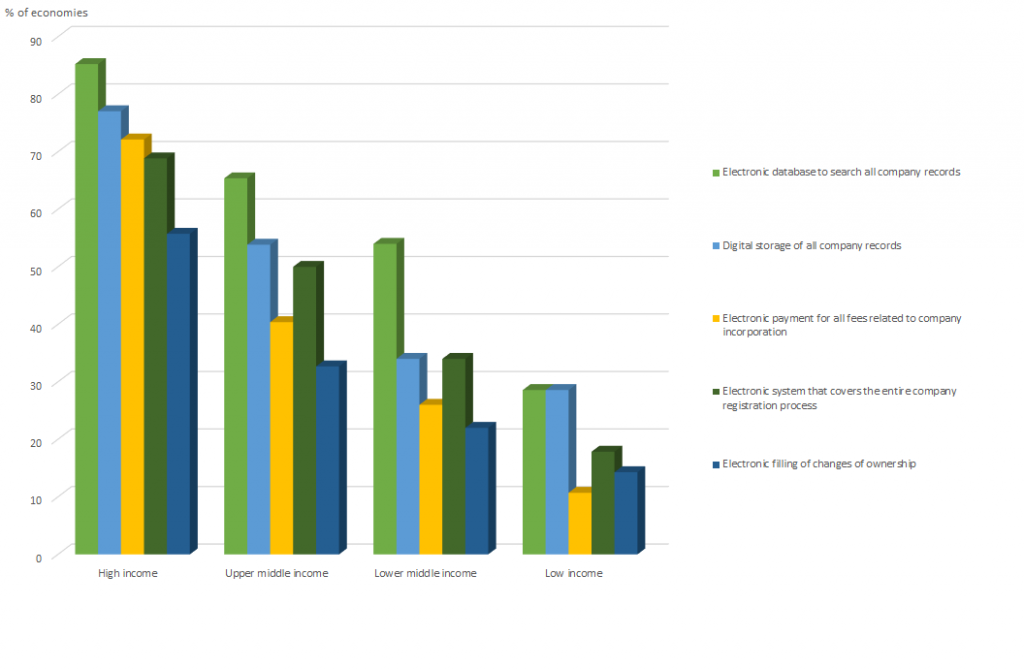 Filling an electronic form on the internet with a laptop.
Filling an electronic form on the internet with a laptop.
The COVID-19 pandemic contributed to the acceleration of digital technology adoption by governments. Economies with online services in use before the pandemic were better placed to ensure business continuity. For example, the work of the company registry was never interrupted by local restrictions in New Zealand, where online business registration had been in place since 2008. In other cases, the pandemic triggered digital transformation of business registries. In April 2020 Honduras took several measures to advance digitization, including amendments to the legal provisions on electronic signature, as well as development of digital tools to support business registration and electronic payments.
Beyond tackling the crisis, the digital transformation of business registries not only improves the process efficiency, but also contributes to reducing informality. After Guatemala introduced online business registration for instance, business registration increased by 40%.[1] Smaller or remote firms are more likely to register their businesses online even if they operate at a distance from the registrar’s office. Digital platforms also increase transparency as company information can be easily extracted for regulatory oversight and audit purposes or risk analysis of potential trading partners.
Entrepreneurs in high-income economies are more likely to have access to online services.
The digitization of business registries tends to be associated with the level of economic development (Figure 1). Among the online features developed by business registries, electronic database to search all company records appeared to be more widespread across all 191 economies studied in 2020. However, sharp differences were observed across income levels. Electronic database to search all company records was available in 85% of high-income economies compared to only 29% of low-income economies.
One of the most appealing digital service for entrepreneurs is online business registration and payment. An electronic system in place that covered the entire company registration process was available in 47% of the economies studied in 2020. As of 2020, 42% of the economies offered an electronic payment for all fees related to company incorporation. However, 69% of high-income economies fully digitized the entire business registration process, but only 18% of low-income economies enabled entrepreneurs to register their start-ups online. This figure was even lower for electronic payments with only 11% of low-income economies providing the service.
The least developed online service provided by business registries was fully electronic filing of changes of ownership. It was offered by 56% of high-income economies and only by 14% of low-income economies.
Figure 1. Online services at the business registry are more common in higher income economies

Source: Doing Business database.
Note: The sample covers 191 economies.
Sub-Saharan Africa and Latin America display the largest gaps in digitization of business registries.
Region-wise the gaps in digitization of business registration were more apparent in Latin America & Caribbean and Sub-Saharan Africa. An electronic system covering the entire company registration process was available in 31% of Latin America & Caribbean economies and 29% of Sub-Saharan African economies. The possibility to pay online was even lower: only 19% of the economies in both Sub-Saharan Africa and Latin America & Caribbean had a digital payment system in place (Figure 2).
Figure 2. Gaps are higher in Latin America & Caribbean and Sub-Saharan Africa
Source: Doing Business database.
Note: The sample covers 191 economies.
Same regional patterns were observed for other services provided by business registries. The possibility to file the changes of ownership electronically was available only in about 22% of economies in both Latin America & Caribbean and Sub-Saharan Africa.
Digital technologies contribute to business continuity, but the widespread use of online business registration is far from ubiquitous.
As mobility restrictions limited the ability of entrepreneurs to register a company, fully online business registration systems reduced the likelihood of interruptions of services. The prevalence of online business registration platforms in high-income economies helped to a certain extent with business continuity in the context of the COVID-19 pandemic.
Another significant factor contributing to business continuity was electronic exchange between the registry and agencies. Fully integrated systems are important. The entire business start-up process could only be completed online if the agencies were electronically integrated and electronic payments were accepted. Such digital integration of agencies involved in business start-up process set the stage for fewer interruptions in the events like the COVID-19 pandemic and related restrictions. In 2020, 64% of high-income economies had an electronic exchange between the registry and agencies compared to 29% of low-income economies. And the gaps prevailed in Latin America & Caribbean and Sub-Saharan Africa: 72% and 67% of economies respectively did not have an electronic exchange between the registry and agencies.
The availability of the digital system does not always translate into efficacy and widespread use. In several countries the use is limited in practice often due to outdated regulatory frameworks, unreliable internet connectivity, complexities of the existing systems or restricted templates embedded into online platforms. The legal and regulatory framework can be an obstacle. Outdated company laws and the lack of a legal basis for online transactions prevent some company registries from making full use of their automated registry systems. In other cases, the appropriate legal framework is in place, but some IT infrastructure issues are present. For instance, in Lesotho, where only 30% of population used internet[2], most entrepreneurs did not use online business registration services that were offered by registry.
With widespread COVID-19 related restrictions more economies are moving towards online services at business registries. More research will be necessary to have a deeper understanding of the impact of the pandemic on digitization of business registries.




Join the Conversation